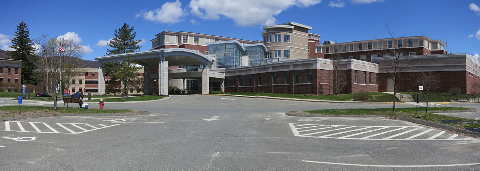Tapping the “Collaborative Spirit” Anew

INSIDE THE ISSUE
> Post-Acute Care Summit
> Cooperation Needed to Heal System
> North Adams Regional Hospital
> Boston Children’s/Franciscan Children’s
> Workforce Hearing
> Community Benefits
> July 4
MONDAY REPORT
Post-Acute Care Summit Focuses on Revamping Care Transitions
Nearly 125 people attended MHA’s virtual Post-Acute Care Summit last week, which took a deep dive into one of the biggest problems affecting the Massachusetts healthcare system – the inability to transition patients out of hospitals to the next level of care.
As a recent MHA report detailed, about 1,200-plus patients are regularly “stuck” in medical/surgical acute care hospital beds as they await discharge to a post-acute care facility, a community-based setting, or a psychiatric unit. The resulting backups mean patients who are awaiting placement to non-hospital settings are not receiving the specialized treatment they need, and patients who require hospital-level care are forced to wait longer in emergency departments until the bed they need is available. The issue has resulted in a clogged healthcare system that causes longer hospital wait times, care access challenges, and an increasingly strained workforce.
Last Tuesday’s MHA forum brought together leaders from across the care continuum and state officials to discuss, among other things, how to redesign care transition processes, strengthen partnerships between organizations, and use data to track results.
For example, Amy Jo, Clinical Strategy & Innovation Officer for Care Central VNA & Hospice, spoke about the data-driven process around hospital readmissions, including auditing 100% of their rehospitalizations using a 20-point root cause analysis tool to determine where troubles emerged and how care could have been better managed. These cases are reviewed monthly to identify trends and make improvements using a Study, Plan, Act, Do process.
Stephanie Martinez, R.N., the associate chief nursing officer at Boston Medical Center (BMC), discussed how the hospital re-engineered its case management structure from an organization standpoint; instituted initiatives to recruit, retain, and engage care management staff — including social workers — who are under enormous pressures and suffering from burnout; and re-focused on complex care management for those patients with complex discharge barriers related to immigration status, lack of insurance coverage, guardianship, and social determinants of health. BMC also implemented new physician roles – such as an Emergency Department Capacity M.D. – to identify and reduce avoidable admissions as well as facilitate inpatient discharges.
Tracy Lee, R.N., the associate chief nursing officer at Beth Israel Deaconess Medical Center (BIDMC), discussed her facility’s very recent reorganization of case management, which had been in the works for years but was interrupted by the pandemic.
“Our case managers were responsible for both discharge planning and utilization review, which as you can imagine were competing priorities every single day,” she said. So BIDMC instituted a “triad level of care” – meaning case management, utilization management, and inpatient social work are all treated as separate, but connected, entities in the management flow chart.
“Most importantly, is patient communication and documentation of the patient’s estimated day of discharge on the white boards,” Lee added. “Really setting expectations with patients and their families about when they should be going home, what level of care they are going to, who is picking them up – and all those other elements that are so important.”
Other discussions focused on how Baystate Health and CareOne Integrated Healthcare Network came to an agreement whereby CareOne would provide use of a well-appointed short term rehab unit within their existing East Longmeadow facility, and Baystate would agree to provide limited financial assistance, as well as access to the nurse agency pool used Baystate uses for interim nursing staff. Tufts Medical Center outlined its recently implemented skilled nursing facility bed reservation system with the North End Rehabilitation and Healthcare Center that addresses capacity challenges and improves the quality of Tufts’ patient discharges.
Mass General Brigham, Southcoast Health, and UMass Memorial Health also presented on their initiatives. MHA’s program also featured Amy Bianco, senior director of Health Policy & Strategic Initiatives at the Massachusetts Executive Office of Health & Human Services, and Rebekah Gardner, M.D., senior medical scientist at Healthcentric Advisors.
“We want to thank all of our post-acute care partners – our inpatient rehabilitation facilities, long-term acute care hospitals, hospice, home health, aging services access points, VNAs, skilled nursing facilities, nursing homes, and our new hospital at home partners – for the many collaborations that we have used on behalf of patients during the pandemic,” said Kim Stevenson, MHA’s senior manager of Clinical Affairs. “We are truly excited to build-upon these partnerships for patients moving forward.”
Walsh Says “Collaborative Spirit” Needed for Health System Reform
MHA President & CEO Steve Walsh said last week before the association’s post-acute forum (see above story) that the care transition imbroglios that are affecting hospital capacity and exacerbating workforce issues are just one part of a fractured healthcare system that must be repaired.
“We’re seeing how record workforce shortages – with 19,000 vacancies in Massachusetts hospitals alone – combined with capacity constraints have led to 1,200 patients regularly being stuck in our facilities without the ability to transition to the next level of care,” Walsh said. “Add to this the fact that provider finances remain as strained as ever, due in large part to the extraordinary measures they are taking to maintain their workforce and keep services accessible for patients.”
Walsh said that although the situation is dire, the commonwealth’s ability to heal the healthcare system and thrive has been proven time and again. Recently, a new report from the Commonwealth Fund shows that Massachusetts had the lowest rate of preventable and treatable deaths of all states during the height of the COVID-19 pandemic, as highlighted by MASSterList last week.
“When the pandemic struck, everyone involved in healthcare — hospitals, elected officials, insurers, organized labor, and beyond – came together, put differences aside, and worked together to keep our commonwealth safe. It’s clear from this report just how profound of an impact this approach had in saving lives,” said Walsh. “Massachusetts is now facing a new round of issues that will shape the future of our healthcare system. We owe it to our patients and caregivers to use the same collaborative spirit and partner around solutions that increase access to care, close inequities, and keep cost at the forefront.”
Walsh said another benefit that Massachusetts enjoys, which is different from the situation in other states, is the recognition from the commonwealth’s political leaders of healthcare’s importance.
“The Healey-Driscoll Administration recognizes not only the world-class care our healthcare organizations provide to patients, but the profound economic and philanthropic imprint they have on their communities as well,” he said. “The legislature throughout the pandemic to today – from its leadership to key committee chairs, to the rank and file who understand the importance of their local hospitals – has been a true partner in maintaining the preeminence of our remarkable healthcare system.”
Walsh said that the all-hands-on-deck partnership shown during the pandemic should provide a blueprint for how the commonwealth confronts the issues of workforce, capacity, administrative burdens, and difficult healthcare finances.
A Rarity: Closed Inpatient Hospital May Reopen

Berkshire Health Systems (BHS) made an announcement last Thursday that is unique at a time when hospitals are faced with difficult decisions on how to maintain services due to workforce shortages and declining reimbursements: Berkshire hopes to re-open 25 inpatient beds at the previous North Adams Regional Hospital that closed in 2014.
The hospital in North Adams, prohibited in 2014 from designating itself as a Critical Access Hospital (CAH) that would have allowed it to receive higher reimbursements, closed that year in March. Berkshire bought the hospital campus that year and invested millions to run an emergency room there, as well as outpatient services, wellness programs, and physician services. The facility is now known as Berkshire Health North.
But with changes in federal rules that will make it easier to achieve federal critical access hospital designation, Berkshire believes it can re-open 25 inpatient beds. The move still needs federal and state approval.
“A CAH designation would signal an exciting new development in the deep history of our North Adams campus,” said Darlene Rodowicz, BHS president and CEO. “To celebrate the facility’s legacy of high-quality care, we are proud to reimagine this hospital facility under a familiar name—North Adams Regional Hospital. Once approved, the updated North Adams Regional Hospital will offer state-of-the-art medical and surgical services on a scale that meets the needs of Northern Berkshire residents today and into the future.” If all goes as planned, the new North Adams Regional Hospital could open in November or December of this year, BHS said in a news release.
Boston Children’s and Franciscan Form “Sister Organization” Affiliation
Boston Children’s Hospital and Franciscan Children’s have finalized a “sister organization” affiliation agreement that will expand children’s mental health and rehabilitative care, effective July 1.
The organizations announced that the affiliation will allow “fully integrated care” between the facilities, and will entail investments to increase available beds, building “a more diverse care workforce,” and modernizing the Franciscan campus.

“We are in the midst of a children’s mental health crisis, and it’s clear our system simply isn’t working for children and families,” said Boston Children’s Hospital President and CEO Dr. Kevin Churchwell. “It’s why we are coming together as one team to act with the urgency this crisis demands.”
“We have a once-in-a-generation opportunity together to create a transformative new model of children’s behavioral and rehabilitative care, better serving the needs of our community and the children and families we serve,” said Franciscan Children’s President and CEO Dr. Joseph Mitchell.
As part of the agreement, $500 million will be invested to update the Franciscan campus, including construction of a new building. By 2030, the organizations intend to hire 150 to 200 new full-time employees related to care for children, “and invest in programs to build a diverse employee pipeline from high school through medical school.” Twenty-nine new inpatient beds will be created and the hospitals will nearly double behavioral health bed capacity. The facilities will retain their names.
Important Hearing on Nursing Practice This Week
The Joint Committee on Public Health will host a hybrid hearing on Wednesday, July 6 at 9 a.m, where several bills relative to healthcare facilities and workforce development will be heard. Of particular importance, H.3613, An Act to improve healthcare workforce development through graduate nursing practice, would make permanent the pandemic-time flexibility that has allowed nursing school seniors and recent graduates to play an expanded role in care delivery.
Section 41 of an appropriations bill that Governor Healey signed on March 29 extends the authorization of nursing practice by graduates and students in their last semester of nursing education programs until March 31, 2024, under guidance from the Board of Registration in Nursing. The graduates or soon to be graduates are authorized to practice nursing if they are employed by or providing healthcare services in a licensed healthcare facility or a licensed healthcare provider, and are directly supervised by a licensed nurse.
Massachusetts healthcare providers have cited the temporary policy’s importance and proven success throughout the COVID-19 pandemic. With a shortage of more than 19,000 unfilled positions across Massachusetts hospitals, H.3613 is just one of the many MHA policy proposals before the legislature to address the workforce shortage and to ensure the commonwealth has a sustainable base of caregivers for the future.
Two Systems – Baystate and UMass – Discuss Community Benefits
Each year, Massachusetts hospitals commit up to $800 million in community benefit programs, which are provided at no cost to those being served and are not reimbursed by state or federal government.
Hospitals reach out to their communities at schools, senior centers, mobile health vans, job fairs, and countless other venues to make healthcare happen before people ever enter one of their facilities.
In this recent video blog, Baystate Health’s President and CEO Mark Keroack, M.D. shares how the system uses the results from the Community Health Needs Assessment to identify and better serve the needs of its community.
And in this “leadership dialogue session” video from the American Hospital Association, Doug Brown, president of UMass Memorial Community Hospitals and chief administrative officer of UMass Memorial Health, and an AHA Board member, discusses how the system reimagined its role as an “anchor organization” to lift up the community.
Electronic Clinical Quality Measure: Addressing Social Needs

MHA’s offices will be closed today and tomorrow for the July 4 holiday. As we celebrate the birth of the U.S. and our democratic system of government it’s noteworthy that studies throughout the years have shown that democracy, as opposed to authoritarianism, is good for health. For example, the 2004 paper entitled “Effect of democracy on health: ecological study” looked at the extent of freedom allowed by political regimes and the effect on a nation’s health.
It concluded: “Democracy shows an independent positive association with health, which remains after adjustment for a country’s wealth, its level of inequality, and the size of its public sector. Democracy, political rights, and civil liberties are politically modifiable variables that seem to be associated with health status. In our study, democracy showed a stronger and more significant association with indicators of health (life expectancy and infant and maternal mortality) than indicators such as gross national product, total government expenditure, or inequality in income. When all these variables were taken into account, the economic ones lost their weight, thereby increasing the importance of the effect of democracy.”

 Massachusetts Health & Hospital Association
Massachusetts Health & Hospital Association